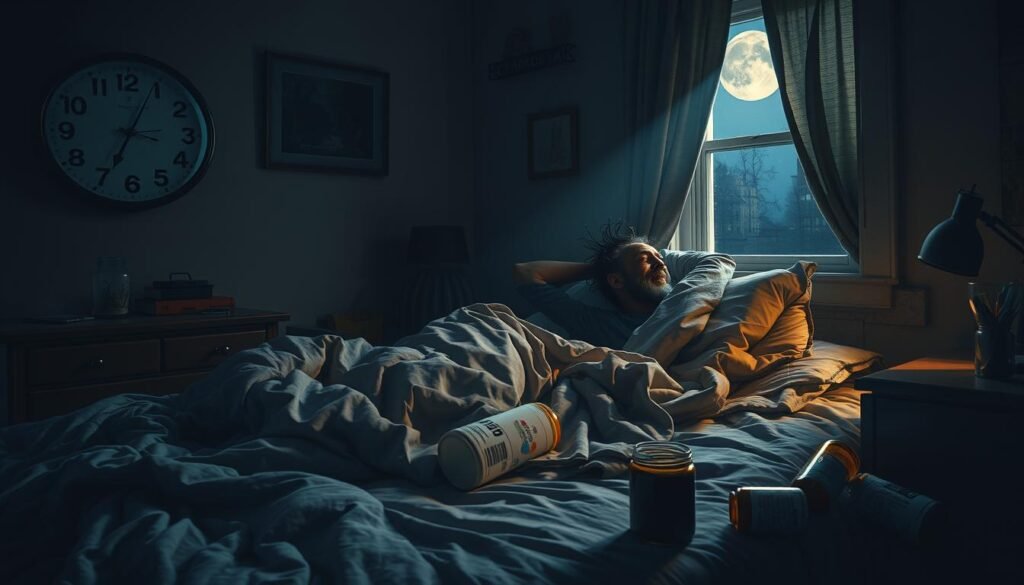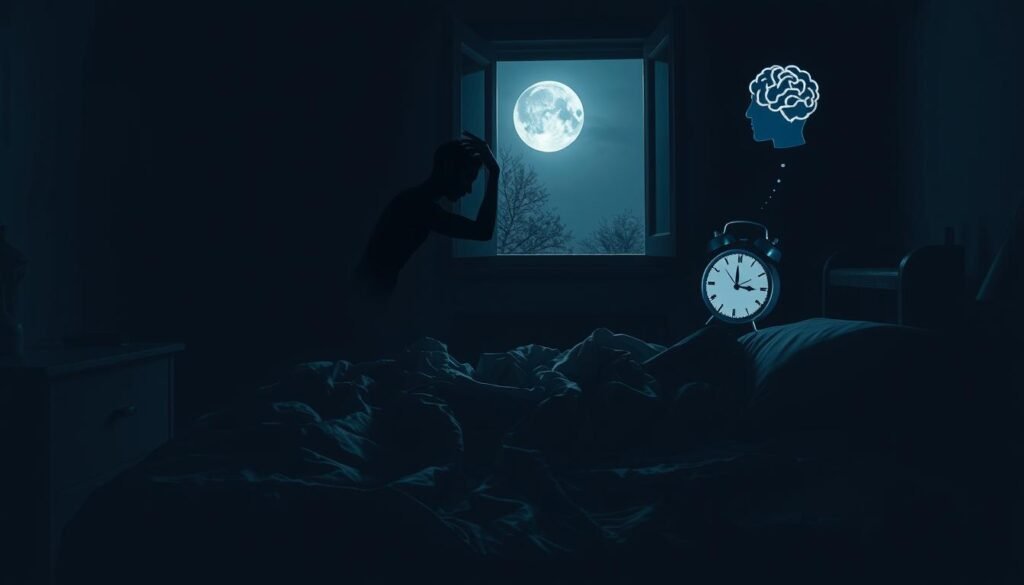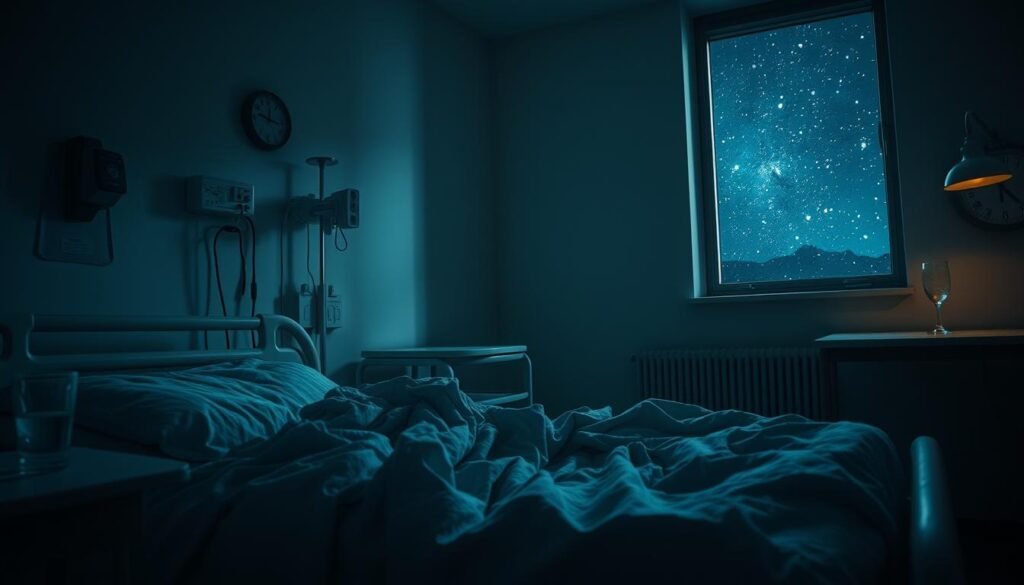About 30% of adults in the United States face chronic insomnia. This is according to recent studies. This fact highlights the importance of knowing about chronic insomnia and its effects. Chronic insomnia falls under the ICD-10 coding system, with the code G47.0. This code covers various sleep disorders. The World Health Organization emphasizes the importance of accurate coding in healthcare. The next ICD-10-CM G47.00 edition, starting on October 1, 2024, will bring changes. Healthcare providers need to stay updated on these changes. This ensures they can diagnose and treat insomnia effectively.
This guide will explore how chronic insomnia is classified, its symptoms, and how it affects health. Understanding these parts is key. It changes how healthcare workers treat people with chronic insomnia.
Key Takeaways
- The ICD-10 code for insomnia is G47.0.
- Chronic insomnia affects roughly 30% of U.S. adults.
- The new ICD-10-CM version will be implemented on October 1, 2024.
- Insomnia classification is essential for effective treatment.
- Inadequate sleep can lead to severe health issues.
- Understanding insomnia codes helps healthcare providers diagnose accurately.
Understanding Chronic Insomnia
Chronic insomnia impacts about 10-15% of people. It’s important to know how it’s different and serious. Unlike short-term insomnia, chronic insomnia lasts for three months or more. This can lead to sleep problems that affect health and daily life.
The condition, called F51.02 in the ICD-10, includes symptoms that don’t go away. People with it struggle to fall asleep, stay asleep, or feel rested. This can cause tiredness and lower mental sharpness during the day.
It’s key to understand how insomnia differs from other sleep issues. Insomnia without drug use or medical reasons is known as Insomnia Disorder in the DSM-V. Knowing this helps doctors treat insomnia correctly. Often, insomnia gets confused with other sleep problems.
- Chronic insomnia is often characterized by:
- Difficulty initiating or maintaining sleep
- Waking up too early and being unable to return to sleep
- Nonrestorative sleep, leading to daytime tiredness
- Coexisting medical or mental health conditions should not fully account for the sleep disturbances.
Learning about chronic insomnia is critical for choosing the right treatment. This knowledge helps people improve their sleep and their overall life quality.
What is the ICD-10 Code for Insomnia?
The ICD-10 code for insomnia is in a group called G47.0. This group is for those who can’t sleep well. The code G47.09 stands for “Other insomnia.” This helps doctors pick the right treatment for you.
Starting October 1, 2024, the new 2025 ICD-10-CM code will be used. The code G47.09, for example, includes “Persistent organic insomnia.” Such detailed coding is key for getting the right treatment.
Since October 1, 2015, using these ICD-10-CM codes has been a must. There’s also a code, F51.0, for insomnia not linked to substances or other health issues. Knowing these codes helps doctors treat you better and makes billing easier.
Coding insomnia correctly is very important. It makes sure you get the care you need. It also helps doctors and hospitals handle insurance claims the right way.
Chronic Insomnia ICD 10 Code: Classification and Details
The code G47.0 is important for doctors to classify chronic insomnia. It covers different types of insomnia. Some are due to psychological reasons or other health issues. It also points out which conditions should not be classified under this code.
The code F51.01 deals with primary insomnia. It is categorized under mental and behavioral disorders. Starting October 1, 2024, it will follow the newest clinical guidelines. This ensures proper diagnosis and treatment.
Some specific types of insomnia have their own codes. For example, if it’s caused by alcohol or drugs, codes like F10.182 and F11.182 are used. The F51.01 code also notes idiopathic insomnia, setting it apart from other kinds.
Doctors use these codes to pick the best treatment. Cognitive-behavioral therapy for insomnia (CBT-I) is one of the top methods. It offers lasting benefits. CBT-I can be done in groups, through telemedicine, or even apps. This helps more people get the treatment they need.
| ICD-10 Code | Description | Category | Exclusions |
|---|---|---|---|
| G47.0 | Chronic Insomnia | Sleep Disorders | Conditions requiring separate codes |
| F51.01 | Primary Insomnia | Mental, Behavioral, and Neurodevelopmental Disorders | Organic sleep disorders |
| F10.182 | Insomnia due to Alcohol Use | Mental Disorders | Requires separate classification |
| F11.182 | Insomnia due to Drug Use | Mental Disorders | Requires separate classification |
Knowing these codes helps doctors manage chronic insomnia better. Good sleep habits are also key for well-being. Doctors should guide their patients using practical advice, like tips found at effective management tips.
Symptoms of Chronic Insomnia
Chronic insomnia can greatly hurt one’s life. It comes with many symptoms:
- Difficulty falling asleep
- Frequent awakenings during the night
- Waking up too early and being unable to return to sleep
- Restlessness during sleep
- Fatigue or lack of refreshment upon waking
These symptoms can really mess with daily life. It’s key to spot them early. Around 50-70 million people in the U.S. are dealing with sleep issues. This shows how common chronic insomnia is.
Some people feel moody or can’t focus because of sleep problems. Not sleeping well can make you feel irritable. It can also make concentrating hard. The DSM-5 talks more about not being happy with sleep. It mentions how it can affect many parts of life. Knowing these symptoms is important for better health and a happier life.

| Symptom | Description |
|---|---|
| Difficulties initiating sleep | Struggling to fall asleep within a reasonable time frame. |
| Frequent awakenings | Waking up multiple times throughout the night. |
| Early morning awakenings | Waking up too early and unable to fall back asleep. |
| Daytime fatigue | Constant tiredness and lack of energy during the day. |
It’s critical to understand the symptoms of chronic insomnia. Insights from research can guide us to the right treatments. For more on how it’s diagnosed, see this resource.
Diagnosis Criteria for Chronic Insomnia
To diagnose chronic insomnia, a detailed medical evaluation is needed. Doctors look at the patient’s medical past and sleep habits. They also check for any health issues that might affect sleep. For a diagnosis of chronic insomnia, symptoms must happen at least three times a week and last for three months or more.
Doctors sometimes use sleep studies to find out what’s wrong. These studies are important to create the right treatment plans. They help tell chronic insomnia apart from other sleep issues with similar signs.
It’s crucial to spot how insomnia affects mental health early. Anxiety and depression are common effects. People with sleep problems should get help if it’s harming their daily life.
Doing something about chronic insomnia helps you sleep better and reduces mental health risks. Here’s a link for more on how untreated insomnia can impact mental health.
Impact of Chronic Insomnia on Health
Chronic insomnia is a big health problem. It does more than just make you tired. It affects your daily life in many ways. People with insomnia often struggle to think clearly. They find it hard to focus and remember things. This can lower how well they do at work and home.
Insomnia also hits mental health hard. Those with it usually feel more anxious and depressed. These insomnia consequences make a bad loop. Poor sleep makes mental health worse, causing more sleep issues.
Insomnia doesn’t just affect the mind. It can lead to severe health problems. Studies show that those not sleeping well might get diabetes, heart diseases, and become obese. So, getting enough sleep is key to staying healthy.
It also messes with your mood and how you act. People without enough sleep often feel irritable. This can hurt friendships and how well they get along with others. That’s why we need to take insomnia seriously and treat it.
Knowing how bad insomnia can be shows why we must address it. Making changes in your lifestyle, getting therapy, or taking medicine can help. These steps can improve sleep and lessen its negative effects.

Does Anesthesia Cause Insomnia?
Many people wonder if there’s a link between anesthesia and trouble sleeping. It’s a valid concern, especially for those about to have surgery. Knowing if does anesthesia cause insomnia helps patients prepare for what comes after.
Anesthesia Side Effects
Side effects from anesthesia can affect how well you sleep. Some people may feel confused, restless, or have a hard time sleeping. Sleep problems are more common with general anesthesia than with regional anesthesia. After surgery, many find it hard to get back into a normal sleep routine.
Effects of Anesthesia on Sleep Quality
Studies have found that sleep quality often drops after anesthesia. Pain, the hospital setting, and the type of anesthesia can all make insomnia worse. One research showed that older patients slept better with regional anesthesia than with general. Knowing how different anesthesia methods affect sleep quality after anesthesia is key. For more on this topic, you can check out this study.
| Type of Anesthesia | Prevalence of Insomnia | Sleep Quality |
|---|---|---|
| General Anesthesia | Higher prevalence | Often diminished sleep quality |
| Regional Anesthesia | Lower prevalence | Generally better sleep quality |
Understanding anesthesia and its effects is crucial for both patients and medical professionals. It leads to smarter management of anesthesia and its impact on sleep.
Post-Operative Insomnia and Its Implications
Recovering from surgery, patients often face significant issues with sleep. Surgery and anesthesia can disrupt sleep patterns for days or weeks. This insomnia hampers the body’s healing process, affecting recovery speed and patient happiness.

Sleep Disturbances After Surgery
Sleep issues are usual after surgery due to pain, anxiety, and a change in daily habits. It’s essential for healthcare workers to fully grasp the impact of post-operative insomnia. This condition can cause complications that hurt both physical and emotional health.
Doctors and nurses should watch for sleep problems in their patients. Early action lets them start better sleep routines or lifestyle changes. For more information, go to sleep disturbances and management strategies.
Addressing post-operative insomnia early is crucial. Doing so avoids persistent sleep issues and related health problems like diabetes or heart disease. This approach shows the growing understanding of sleep’s role in post-surgery recovery.
Understanding Sleep Disorders Related to Insomnia
Sleep disorders cover a vast range of issues, more than 80 in fact. They share a close relationship to insomnia. Insomnia involves trouble falling or staying asleep, or not feeling rested. Conditions like obstructive sleep apnea disrupt breathing during sleep, leading to major health problems.
Obstructive sleep apnea can happen to anyone, kids and adults alike, coded as ICD-9 327.23. It makes the airway collapse when you’re asleep. This affects sleep quality and health. Many also feel very sleepy during the day, called hypersomnia, because they didn’t sleep enough at night.
The natural sleep cycle, or circadian rhythm, is key to good sleep. When it’s off, sleep issues can arise, including strange behaviors known as parasomnias. These can signal future health troubles. Disorders from deep sleep and REM sleep show how complex and intertwined with insomnia these conditions are.
Table: Types of Sleep Disorders Related to Insomnia
| Type of Sleep Disorder | Description | ICD-10 Code |
|---|---|---|
| Obstructive Sleep Apnea | Airway collapses during sleep, disrupting breathing | G47.33 |
| Restless Legs Syndrome | Uncontrollable urge to move legs, often disrupting sleep | G25.81 |
| Circadian Rhythm Disorder | Disruption to the natural sleep-wake cycle | G47.20 |
| Parasomnia | Abnormal behaviors during sleep, such as sleepwalking | G47.50 |
| Other Movement Disorders | Includes periodic limb movement and more | G25.89 |
Many things can cause sleep disorders, including mental health issues. These affect sleep quality deeply. The relationship to insomnia underscores the importance of checking and treating these problems together. The ICD-10-CM code G47.9 for an unstated sleep disorder starts on October 1, 2024. This shows the need for clear labels to tackle these conditions well.
How ICD-10 Classification Affects Treatment
The ICD-10 system is key in managing chronic insomnia. It provides codes that clearly state the type and symptoms. This lets healthcare workers create treatments that meet each patient’s needs. Good record-keeping helps doctors work together and keep care consistent everywhere.
Using the right ICD-10 codes affects treatment and how insurance companies handle claims. They need exact codes to cover therapy and medicine costs. This is crucial for the financial health of sleep disorder clinics.
The change to ICD-10 codes has made classifying sleep disorders more precise. A common code for insomnia is G47.00. This upgrade helps track insomnia cases better and supports research to improve management.
| ICD-9 Code | ICD-10 Code | Description |
|---|---|---|
| 780.52 | G47.00 | Insomnia, unspecified |
| 307.4 | G47.8 | Other sleep disorders |
| 780.5 | G47.9 | Sleep disorder, unspecified |
Adding ICD-10 codes to treatment plans helps accurately pinpoint chronic insomnia. Healthcare workers must follow ICD-10-CM Manual’s coding rules. This makes sure billing is right and helps collect data to improve chronic insomnia treatments.
Conclusion
This article sheds light on chronic insomnia, underlining its widespread effects on health. A remarkable number of military staff, 148,441, have faced chronic insomnia from 2012 to 2021. This shows the deep impact of conflicts like Operation Iraqi Freedom on sleep.
Effective treatment blends behavioral therapy with medicine, as 53.9% of service members getting therapy shows. Sleep assessments in clinics are key. They make diagnoses more accurate. In studies, 88.1% of patients in sleep clinics tested positive for sleep disorders.
To wrap up, raising awareness and ongoing education on chronic insomnia are critical. Ignoring it can worsen other health issues and harm patient outcomes. Focusing on strong treatments and support will foster better sleep health overall.